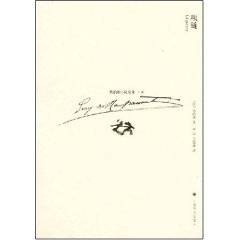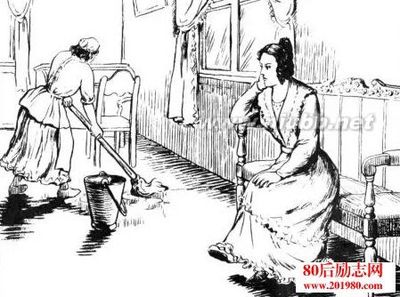What would have happened ifshe had never lost those jewels.
Who knows?Who knows? How strange life is,how fickle!
How little is needed to ruinor to save!
She was one ofthose pretty and charming girls born, as though fate had blunderedover her,into a family of artisans. She had no marriage portion, noexpectations, no means of getting known, understood, loved, andwedded by a man of wealth and distinction; and she let herself bemarried off to a little clerk in the Ministry of Education. Hertastes were simple because she had never been able to afford anyother, but she was as unhappy as though she had married beneathher; for women have no caste or class, their beauty, grace, andcharm serving them for birth or family, their natural delicacy,their instinctive elegance, their nimbleness of wit, are their onlymark of rank, and put the slum girl on a level with the highestlady in the land.
She sufferedendlessly, feeling herself born for every delicacy and luxury. Shesuffered from the poorness of her house, from its mean walls, wornchairs, and ugly curtains. All these things, of which other womenof her class would not even have been aware, tormented and insultedher. The sight of the little Breton girl who came to do the work inher little house aroused heart-broken regrets and hopeless dreamsin her mind. She imagined silent antechambers, heavy with Orientaltapestries, lit by torches in lofty bronze sockets, with two tallfootmen in knee-breeches sleeping in large arm-chairs, overcome bythe heavy warmth of the stove. She imagined vast saloons hung withantique silks, exquisite pieces of furniture supporting pricelessornaments, and small, charming, perfumed rooms, created just forlittle parties of intimate friends, men who were famous and soughtafter, whose homage roused every other woman's enviouslongings.
When she sat down for dinner at the round table covered with athree-days-old cloth, opposite her husband, who took the cover offthe soup-tureen, exclaiming delightedly: "Aha! Scotch broth! Whatcould be better?" she imagined delicate meals, gleaming silver,tapestries peopling the walls with folk of a past age and strangebirds in faery forests; she imagined delicate food served inmarvellous dishes, murmured gallantries, listened to with aninscrutable smile as one trifled with the rosy flesh of trout orwings of asparagus chicken.
She had no clothes, no jewels, nothing. And these were the onlythings she loved; she felt that she was made for them. She hadlonged so eagerly to charm, to be desired, to be wildly attractiveand sought after.
She had a rich friend, an old school friend whom she refused tovisit, because she suffered so keenly when she returned home. Shewould weep whole days, with grief, regret, despair, andmisery.
One evening herhusband came home with an exultant air, holding a large envelope inhis hand.
"Here's something for you," he said.
Swiftly she tore the paper and drew out a printed card on whichwere these words:
"The Minister of Education and Madame Ramponneau request thepleasure of the company of Monsieur and Madame Loisel at theMinistry on the evening of Monday, January the 18th."
Instead of being delighted, as her husband hoped, she flung theinvitation petulantly across the table, murmuring:
"What do you want me to do with this?"
"Why, darling, I thought you'd be pleased. You never go out, andthis is a great occasion. I had tremendous trouble to get it. Everyone wants one; it's very select, and very few go to the clerks.You'll see all the really big people there."
She looked at him out of furious eyes, and said impatiently: "Andwhat do you suppose I am to wear at such an affair?"
He had not thought about it; he stammered:
"Why, the dress you go to the theatre in. It looks very nice, to me. . ."
He stopped, stupefied and utterly at a loss when he saw that hiswife was beginning to cry. Two large tears ran slowly down from thecorners of her eyes towards the corners of her mouth.
"What's the matter with you? What's the matter with you?" hefaltered.
But with a violent effort she overcame her grief and replied in acalm voice, wiping her wet cheeks:
"Nothing.Only I haven't a dress and so I can't go to this party. Give yourinvitation to some friend of yours whose wife will be turned outbetter than I shall."
He was heart-broken.
"Look here, Mathilde," he persisted. "What would be the cost of asuitable dress, which you could use on other occasions as well,something very simple?"
She thought for several seconds, reckoning up prices and alsowondering for how large a sum she could ask without bringing uponherself an immediate refusal and an exclamation of horror from thecareful-minded clerk.
At last she replied with some hesitation:
"I don't know exactly, but I think I could do it on four hundredfrancs."
He grew slightly pale, for this was exactly the amount he had beensaving for a gun, intending to get a little shooting next summer onthe plain of Nanterre with some friends who went lark-shootingthere on Sundays.
Nevertheless he said: "Very well. I'll give you four hundredfrancs. But try and get a really nice dress with themoney."
The day of the party drew near, and Madame Loisel seemed sad,uneasy and anxious. Her dress was ready, however. One evening herhusband said to her:
"What's the matter with you? You've been very odd for the lastthree days."
"I'm utterly miserable at not having any jewels, not a singlestone, to wear," she replied. "I shall look absolutely no one. Iwould almost rather not go to the party."
"Wear flowers," he said. "They're very smart at this time of theyear. For ten francs you could get two or three gorgeousroses."
She was not convinced.
"No . . . there's nothing so humiliating as looking poor in themiddle of a lot of rich women."
"How stupid you are!" exclaimed her husband. "Go and see MadameForestier and ask her to lend you some jewels. You know her quitewell enough for that."
She uttered a cry of delight.
"That's true. I never thought of it."
Next day she went to see her friend and told her hertrouble.
Madame Forestier went to her dressing-table, took up a large box,brought it to Madame Loisel, opened it, and said:
"Choose, my dear."
First she saw some bracelets, then a pearl necklace, then aVenetian cross in gold and gems, of exquisite workmanship. Shetried the effect of the jewels before the mirror, hesitating,unable to make up her mind to leave them, to give them up. She kepton asking:
"Haven't you anything else?"
"Yes. Look for yourself. I don't know what you would likebest."
Suddenly she discovered, in a black satin case, a superb diamondnecklace; her heart began to beat covetously. Her hands trembled asshe lifted it. She fastened it round her neck, upon her h igh dress,and remained in ecstasy at sight of herself.
Then, with hesitation, she asked in anguish:
"Could you lend me this, just this alone?"
"Yes, of course."
She flung herself on her friend's breast, embraced her frenziedly,and went away with her treasure. The day of the party arrived.Madame Loisel was a success. She was the prettiest woman present,elegant, graceful, smiling, and quite above herself with happiness.All the men stared at her, inquired her name, and asked to beintroduced to her. All the Under-Secretaries of State were eager towaltz with her. The Minister noticed her.
She danced madly, ecstatically, drunk with pleasure, with nothought for anything, in the triumph of her beauty, in the pride ofher success, in a cloud of happiness made up of this universalhomage and admiration, of the desires she had aroused, of thecompleteness of a victory so dear to her feminine heart.
She left about four o'clock in the morning. Since midnight herhusband had been dozing in a deserted little room, in company withthree other men whose wives were having a good time. He threw overher shoulders the garments he had brought for them to go home in,modest everyday clothes, whose poverty clashed with the beauty ofthe ball-dress. She was conscious of this and was anxious to hurryaway, so that she should not be noticed by the other women puttingon their costly furs.
Loisel restrainedher.
"Wait a little. You'll catch cold in the open. I'm going to fetch acab."
But she did not listen to him and rapidly descended the staircase.When they were out in the street they could not find a cab; theybegan to look for one, shouting at the drivers whom they sawpassing in the distance.
They walked down towards the Seine, desperate and shivering. Atlast they found on the quay one of those old nightprowlingcarriages which are only to be seen in Paris after dark, as thoughthey were ashamed of their shabbiness in the daylight.
It brought them to their door in the Rue des Martyrs, and sadlythey walked up to their own apartment. It was the end, for her. Asfor him, he was thinking that he must be at the office atten.
She took off the garments in which she had wrapped her shoulders,so as to see herself in all her glory before the mirror. Butsuddenly she uttered a cry. The necklace was no longer round herneck!
"What'sthe matter with you?" asked her husband, already halfundressed.
She turned towards him in the utmostdistress.
"I . . . I . . . I've no longer got MadameForestier's necklace. . . ."
He started with astonishment.
"What! . . . Impossible!"
They searched in the folds of her dress, in the folds of the coat,in the pockets, everywhere. They could not find it.
"Are you surethat you still had it on when you came away from the ball?" heasked.
"Yes, I touched it in the hall at the Ministry."
"But if you had lost it in the street, we should have heard itfall."
"Yes. Probably we should. Did you take the number of thecab?"
"No. You didn't notice it, did you?"
"No."
They stared at one another, dumbfounded. At last Loisel put on hisclothes again.
"I'll go over all the ground we walked," he said,"and see if I can't find it."
And he went out. She remained in her evening clothes, lackingstrength to get into bed, huddled on a chair, without volition orpower of thought.
Her husband returned about seven. He had found nothing.
He went to the police station, to the newspapers, to offer areward, to the cab companies, everywhere that a ray of hopeimpelled him.
She waited all day long, in the same state of bewilderment at thisfearful catastrophe.
Loisel came home at night, his face lined and pale; he haddiscovered nothing.
"You must write to your friend," he said, "and tell her that you'vebroken the clasp of her necklace and are getting it mended. Thatwill give us time to look about us."
She wrote at his dictation.
By the end of a week they had lost all hope.
Loisel, who had aged five years, declared:
"We must see about replacing the diamonds."
Next day they took the box which had held the necklace and went tothe jewellers whose name was inside. He consulted hisbooks.
"It was not I who sold this necklace, Madame; I must have merelysupplied the clasp."
Then they went from jeweller to jeweller, searching for anothernecklace like the first, consulting their memories, both ill withremorse and anguish of mind.
In a shop at the Palais-Royal they found a string of diamonds whichseemed to them exactly like the one they were looking for. It wasworth forty thousand francs. They were allowed to have it forthirty-six thousand.
They begged the jeweller not to sell it for three days. And theyarranged matters on the understanding that it would be taken backfor thirty-four thousand francs, if the first one were found beforethe end of February.
Loisel possessed eighteen thousand francs left to him by hisfather. He intended to borrow the rest.
He did borrow it, getting a thousand from one man, five hundredfrom another, five louis here, three louis there. He gave notes ofhand, entered into ruinous agreements, did business with usurersand the whole tribe of money-lenders. He mortgaged the wholeremaining years of his existence, risked his signature without evenknowing if he could honour it, and, appalled at the agonising faceof the future, at the black misery about to fall upon him, at theprospect of every possible physical privation and moral torture, hewent to get the new necklace and put down upon the jeweller'scounter thirty-six thousand francs.
When Madame Loisel took back the necklace to Madame Forestier, thelatter said to her in a chilly voice:
"You ought to have brought it back sooner; I might have neededit."
She did not, as her friend had feared, open the case. If she hadnoticed the substitution, what would she have thought? What wouldshe have said? Would she not have taken her for a thief?
Madame Loisel came to know the ghastly life of abject poverty. Fromthe very first she played her part heroically. This fearful debtmust be paid off. She would pay it. The servant was dismissed. Theychanged their flat; they took a garret under the roof.
She came to know the heavy work of the house, the hateful duties ofthe kitchen. She washed the plates, wearing out her pink nails onthe coarse pottery and the bottoms of pans. She washed the dirtylinen, the shirts and dish-cloths, and hung them out to dry on astring; every morning she took the dustbin down into the street andcarried up the water, stopping on each landing to get her breath.And, clad like a poor woman, she went to the fruiterer, to thegrocer, to the butcher, a basket on her arm, haggling, insulted,fighting for every wretched halfpenny of her money.
Every month notes had to be paid off, others renewed, timegained.
Her husband worked in the evenings at putting straight a merchant'saccounts, and often at night he did copying at twopence-halfpenny apage.
And this life lasted ten years.
At the end of ten years everything was paid off, everything, theusurer's charges and the accumulation of superimposedinterest.
Madame Loisel looked old now. She had become like all the otherstrong, hard, coarse women of poor households. Her hair was badlydone, her skirts were awry, her hands were red. She spoke in ashrill voice, and the water slopped all over the floor when shescrubbed it. But sometimes, when her husband was at the office, shesat down by the window and thought of that evening long ago, of theball at which she had been so beautiful and so muchadmired.
What would have happened if she had never lost those jewels. Whoknows? Who knows? How strange life is, how fickle! How little isneeded to ruin or to save!
One Sunday, as she had gone for a walk along the Champs-Elysees tofreshen herself after the labours of the week, she caught sightsuddenly of a woman who was taking a child out for a walk. It wasMadame Forestier, still young, still beautiful, stillattractive.
Madame Loisel was conscious of some emotion. Should she speak toher? Yes, certainly. And now that she had paid, she would tell herall. Why not?
She went up to her.
"Good morning, Jeanne."
The other did not recognise her, and was surprised at being thusfamiliarly addressed by a poor woman.
"But. . . Madame . . ." she stammered. "I don't know . . . you must bemaking a mistake."
"No . . . I am Mathilde Loisel."
Her friend uttered a cry.
"Oh! . . . my poor Mathilde, how you have changed! . .."
"Yes, I've had some hard times since I saw you last; and manysorrows . . . and all on your account."
"On my account! . . . How was that?"
"You remember the diamond necklace you lent me for the ball at theMinistry?"
"Yes. Well?"
"Well, I lost it."
"How could you? Why, you brought it back."
"I brought you another one just like it. And for the last ten yearswe have been paying for it. You realise it wasn't easy for us; wehad no money. . . . Well, it's paid for at last, and I'm gladindeed."
MadameForestier had halted.
"You say you bought a diamond necklace to replace mine?"
"Yes. You hadn't noticed it? They were very much alike."
And she smiled in proud and innocent happiness.
Madame Forestier, deeply moved, took her two hands.
"Oh, my poor Mathilde! But mine was imitation. It was worth at thevery most five hundred francs! . . . "
她也是一个美丽动人的姑娘,好像由于命运的差错,生在一个小职员的家里。她没有陪嫁的资产,也没有什么法子让一个有钱的体面人认识她、了解她、爱她、娶她;最后只得跟教育部的一个小书记结了婚。
她不能够讲究打扮,只好穿得朴朴素素,但是她觉得很不幸,好像这降低了她的身份似的。因为在妇女,美丽、丰韵、娇媚,就是她们的出身;天生的聪明,优美的资质,温柔的性情,就是她们惟一的资格。
她觉得她生来就是为着过高雅和奢华的生活,因此她不断地感到痛苦。住宅的寒伧,墙壁的黯淡,家具的破旧,衣料的粗陋,都使她苦恼。这些东西,在别的跟她一样地位的妇人,也许不会挂在心上,然而她却因此痛苦,因此伤心。她看着那个替她做琐碎家事的勃雷大涅省的小女仆,心里就引起悲哀的感慨和狂乱的梦想。她梦想那些幽静的厅堂,那里装饰着东方的帷幕,点着高脚的青铜灯,还有两个穿短裤的仆人,躺在宽大的椅子里,被暖炉的热气烘得打盹儿。她梦想那些宽敞的客厅,那里张挂着古式的壁衣,陈设着精巧的木器,珍奇的古玩。她梦想那些华美的香气扑鼻的小客室,在那里,下午五点钟的时候,她跟最亲密的男朋友闲谈,或者跟那些一般女人所最仰慕最乐于结识的男子闲谈。
每当她在铺着一块三天没洗的桌布的圆桌边坐下来吃晚饭的时候,对面,她的丈夫揭开汤锅的盖子,带着惊喜的神气说:“啊!好香的肉汤!再没有比这更好的了!……”这时候,她就梦想到那些精美的晚餐,亮晶晶的银器;梦想到那些挂在墙上的壁衣,上面绣着古装人物、仙境般的园林、奇异的禽鸟;梦想到盛在名贵的盘碟里的佳肴;梦想到一边吃着粉红色的鲈鱼或者松鸡翅膀,一边带着迷人的微笑听客人密谈。
她没有漂亮服装,没有珠宝,什么也没有。然而她偏偏只喜爱这些,她觉得自己生在世上就是为了这些。她一向就想望着得人欢心,被人艳羡,具有诱惑力而被人追求。
她有一个有钱的女朋友,是教会女校的同学,可是她再也不想去看望她了,因为看望回来就会感到十分痛苦。由于伤心、悔恨、失望、困苦,她常常整天整天地哭泣。
然而,有一天傍晚,她丈夫得意扬扬地回家来,手里拿着一个大信封。
“看呀,”他说,“这里有点东西给你。”
她高高兴兴地拆开信封,抽出一张请柬,上面印着这些字:
“教育部部长乔治·郎伯诺及夫人,恭请路瓦栽先生与夫人于一月十八日(星期一)光临教育部礼堂,参加夜会。”
她不像她丈夫预料的那样高兴,她懊恼地把请柬丢在桌上,咕哝着:
“你叫我拿着这东西怎么办呢?”
“但是,亲爱的,我原以为你一定很喜欢的。你从来不出门,这是一个机会,这个,一个好机会!我费了多大力气才弄到手。大家都希望得到,可是很难得到,一向很少发给职员。你在那儿可以看见所有的官员。”
她用恼怒的眼睛瞧着他,不耐烦地大声说:
“你打算让我穿什么去呢?”
他没有料到这个,结结巴巴地说:
“你上戏园子穿的那件衣裳,我觉得就很好,依我……”
他住了口,惊惶失措,因为看见妻子哭起来了,两颗大大的泪珠慢慢地顺着眼角流到嘴角来了。他吃吃地说:
“你怎么了?你怎么了?”
她费了很大力气才抑制住悲痛,擦干她那润湿的两腮,用平静的声音回答:
“没有什么。只是,没有件像样的衣服,我不能去参加这个夜会。你的同事,谁的妻子打扮得比我好,就把这请柬送给谁去吧。”
他难受了,接着说:
“好吧,玛蒂尔德。做一身合适的衣服,你在别的场合也能穿,很朴素的,得多少钱呢?”
她想了几秒钟,合计出一个数目,考虑到这个数目可以提出来,不会招致这个俭省的书记立刻的拒绝和惊骇的叫声。
末了,她迟疑地答道:
“准数呢,我不知道,不过我想,有四百法郎就可以办到。”
他脸色有点发白了。他恰好存着这么一笔款子,预备买一杆猎枪,好在夏季的星期天,跟几个朋友到南代尔平原去打云雀。
然而他说:
“就这样吧,我给你四百法郎。不过你得把这件长衣裙做得好看些。”
夜会的日子近了,但是路瓦栽夫人显得郁闷、不安、忧愁。她的衣服却做好了。她丈夫有一天晚上对她说:
“你怎么了?看看,这三天来你非常奇怪。”
她回答说:
“叫我发愁的是一粒珍珠、一块宝石都没有,没有什么戴的。我处处带着穷酸气,很不想去参加这个夜会。”
他说:
“戴上几朵鲜花吧。在这个季节里,这是很时新的。花十个法郎,就能买两三朵别致的玫瑰。”
她还是不依。
“不成,……在阔太太中间露穷酸相,再难堪也没有了。”
她丈夫大声说:
“你多么傻呀!去找你的朋友佛来思节夫人,向她借几样珠宝。你跟她很有交情,这点事满可以办到。”
她发出惊喜的叫声。
“真的!我倒没想到这个。”
第二天,她到她的朋友家里,说起自己的烦闷。
佛来思节夫人走近她那个镶着镜子的衣柜,取出一个大匣子,拿过来打开了,对路瓦栽夫人说:
“挑吧,亲爱的。”
她先看了几副镯子,又看了一挂珍珠项链,随后又看了一个威尼斯式的镶着宝石的金十字架,做工非常精巧。她在镜子前边试这些首饰,犹豫不决,不知道该拿起哪件,放下哪件。她不断地问着:
“再没有别的了吗?”
“还有呢。你自己找吧,我不知道哪样合你的意。”
忽然她在一个青缎子盒子里发现一挂精美的钻石项链,她高兴得心都快跳出来了。她双手拿着那项链发抖。她把项链绕着脖子挂在她那长长的高领上,站在镜前对着自己的影子出神好半天。
随后,她迟疑而焦急地问:
“你能借给我这件吗?我只借这一件。”
“当然可以。”
她跳起来,搂住朋友的脖子,狂热地亲她,接着就带着这件宝物跑了。
夜会的日子到了,路瓦栽夫人得到成功。她比所有的女宾都漂亮、高雅、迷人,她满脸笑容,兴高采烈。所有的男宾都注视她,打听她的姓名,求人给介绍;部里机要处的人员都想跟她跳舞,部长也注意她了。
她狂热地兴奋地跳舞,沉迷在欢乐里,什么都不想了。她陶醉于自己的美貌胜过一切女宾,陶醉于成功的光荣,陶醉在人们对她的赞美和羡妒所形成的幸福的云雾里,陶醉在妇女们所认为最美满最甜蜜的胜利里。
她是早晨四点钟光景离开的。她丈夫从半夜起就跟三个男宾在一间冷落的小客室里睡着了。那时候,这三个男宾的妻子也正舞得快活。
她丈夫把那件从家里带来预备给她临走时候加穿的衣服,披在她的肩膀上。这是件朴素的家常衣服,这件衣服的寒伧味儿跟舞会上的衣服的豪华气派很不相称。她感觉到这一点,为了避免那些穿着珍贵皮衣的女人看见,想赶快逃走。
路瓦栽把她拉住,说:
“等一等,你到外边要着凉的。我去叫一辆马车来。”
但是她一点也不听,赶忙走下台阶。他们到了街上,一辆车也没看见,他们到处找,远远地看见车夫就喊。
他们在失望中顺着塞纳河走去,冷得发抖,终于在河岸上找着一辆拉晚儿的破马车。这种车,巴黎只有夜间才看得见;白天,它们好像自惭形秽,不出来。
车把他们一直拉到马丁街寓所门口,他们惆怅地进了门。在她,一件大事算是完了。她丈夫呢,就想着十点钟得到部里去。
她脱下披在肩膀上的衣服,站在镜子前边,为的是趁这荣耀的打扮还在身上,再端详一下自己。但是,她猛然喊了一声。脖子上的钻石项链没有了。
她丈夫已经脱了一半衣服,就问:
“什么事情?”
她吓昏了,转身向着他说:
“我……我……我丢了佛来思节夫人的项链了。”
他惊惶失措地直起身子,说:
“什么!……怎么啦!……哪儿会有这样的事!”
他们在长衣裙褶里、大衣褶里寻找,在所有口袋里寻找,竟没有找到。
他问:
“你确实相信离开舞会的时候它还在吗?”
“是的,在教育部走廊上我还摸过它呢。”
“但是,如果是在街上丢的,我们总听得见声响。一定是丢在车里了。”
“是的,很可能。你记得车的号码吗?”
“不记得。你呢,你没注意吗?”
“没有。”
他们惊惺地面面相觑。末后,路瓦栽重新穿好衣服。
“我去,”他说,“把我们走过的路再走一遍,看看会不会找着。”
他出去了。她穿着那件参加舞会的衣服,连上床睡觉的力气也没有,只是倒在一把椅子里发呆,精神一点也提不起来,什么也不想。
七点钟光景,她丈夫回来了。什么也没找着。
后来,他到警察厅去,到各报馆去,悬赏招寻,也到所有车行去找。总之,凡有一线希望的地方,他都去过了。
她面对着这不幸的灾祸,整天等候着,整天在惊恐的状态里。
晚上,路瓦栽带着瘦削苍白的脸回来了,一无所得。
“应该给你的朋友写信,”他说,“说你把项链的搭钩弄坏了,正在修理。这样,我们才有周转的时间。”
她照他说的写了封信。
过了一个星期,他们所有的希望都断绝了。
路瓦栽,好像老了五年,他决然说:
“应该想法赔偿这件首饰了。”
第二天,他们拿了盛项链的盒子,照着盒子上的招牌字号找到那家珠宝店。老板查看了许多账簿,说:
“太太,这挂项链不是我卖出的;我只卖出这个盒子。”
于是他们就从这家珠宝店到那家珠宝店,凭着记忆去找一挂同样的项链。两个人都愁苦不堪,快病倒了。
在皇宫街一家铺子里,他们看见一挂钻石项链,正跟他们找的那一挂一样,标价四万法郎。老板让了价,只要三万六千。
他们恳求老板,三天以内不要卖出去。他们又订了约,如果原来那一挂在二月底以前找着,那么老板可以拿三万四千收回这一挂。
路瓦栽现有父亲遗留给他的一万八千法郎。其余的,他得去借。
他开始借钱了。向这个借一千法郎,向那个借五百法郎,从这儿借五个路易,从那儿借三个路易。他签了好些债券,订了好些使他破产的契约。他跟许多放高利贷的人和各种不同国籍的放债人打交道。他顾不得后半世的生活了,冒险到处签着名,却不知道能保持信用不能。未来的苦恼,将要压在身上的残酷的贫困,肉体的苦楚,精神的折磨,在这一切的威胁之下,他把三万六千法郎放在商店的柜台上,取来那挂新的项链。
路瓦栽夫人送还项链的时候,佛来思节夫人带着一种不满意的神情对她说:
“你应当早一点还我,也许我早就要用它了。”
佛来思节夫人没有打开盒子。她的朋友正担心她打开盒子。如果她发觉是件代替品,她会怎样想呢?会怎样说呢?她不会把她的朋友当作一个贼吗?
路瓦栽夫人懂得穷人的艰难生活了。她一下子显出了英雄气概,毅然决然打定了主意。她要偿还这笔可怕的债务。她就设法偿还。她辞退了女仆,迁移了住所,租赁了一个小阁楼住下。
她懂得家里的一切粗笨活儿和厨房里的讨厌的杂事了。她刷洗杯盘碗碟,在那油腻的盆沿上和锅底上磨粗了她那粉嫩的手指。她用肥皂洗衬衣,洗抹布,晾在绳子上。每天早晨,她把垃圾从楼上提到街上,再把水从楼下提到楼上,走上一层楼,就站住喘气。她穿得像一个穷苦的女人,胳膊上挎着篮子,到水果店里,杂货店里,肉铺里,争价钱,受嘲骂,一个铜子一个铜子地节省她那艰难的钱。
月月都得还一批旧债,借一些新债,这样来延缓清偿的时日。
她丈夫一到晚上就给一个商人誊写账目,常常到了深夜还在抄写五个铜子一页的书稿。
这样的生活继续了十年。
第十年年底,债都还清了,连那高额的利息和利上加利滚成的数目都还清了。
路瓦栽夫人现在显得老了。她成了一个穷苦人家的粗壮耐劳的妇女了。她胡乱地挽着头发,歪斜地系着裙子,露着一双通红的手,高声大气地说着话,用大桶的水刷洗地板。但是有时候,她丈夫办公去了,她一个人坐在窗前,就回想起当年那个舞会来,那个晚上,她多么美丽,多么使人倾倒啊!
要是那时候没有丢掉那挂项链,她现在是怎样一个境况呢?谁知道呢?谁知道呢?人生是多么奇怪,多么变幻无常啊,极细小的一件事可以败坏你,也可以成全你!
有一个星期天,她到极乐公园去走走,舒散一星期来的疲劳。这时候,她忽然看见一个妇人领着一个孩子在散步。原来就是佛来思节夫人,她依旧年轻,依旧美丽动人。
路瓦栽夫人无限感慨。她要上前去跟佛来思节夫人说话吗?当然,一定得去。而且现在她把债都还清,她可以完全告诉她了。为什么不呢?
她走上前去。
“你好,珍妮。”
那一个竟一点也不认识她了。一个平民妇人这样亲昵地叫她,她非常惊讶。她磕磕巴巴地说:
“可是……太太……我不知道……你一定是认错了。”
“没有错。我是玛蒂尔德·路瓦栽。”
她的朋友叫了一声:
“啊!……我可怜的玛蒂尔德,你怎么变成这样了!……”
“是的,多年不见面了,这些年来我忍受着许多苦楚,……而且都是因为你!……”
“因为我?……这是怎么讲的?”
“你一定记得你借给我的那挂项链吧,我戴了去参加教育部夜会的那挂。”
“记得。怎么样呢?”
怎么样?我把它丢了。”
“哪儿的话!你已经还给我了。”
“我还给你的是另一挂,跟你那挂完全相同。你瞧,我们花了十年工夫,才付清它的代价。你知道,对于我们这样什么也没有的人,这可不是容易的啊!……不过事情到底了结了,我倒很高兴了。”
佛来思节夫人停下脚步,说:
“你是说你买了一挂钻石项链赔我吗?”
“对呀。你当时没有看出来?简直是一模一样的啊。”
于是她带着天真的得意的神情笑了。
佛来思节夫人感动极了,抓住她的双手,说:
“唉!我可怜的玛蒂尔德!可是我那一挂是假的,至多值五百法郎!……”
 爱华网
爱华网


